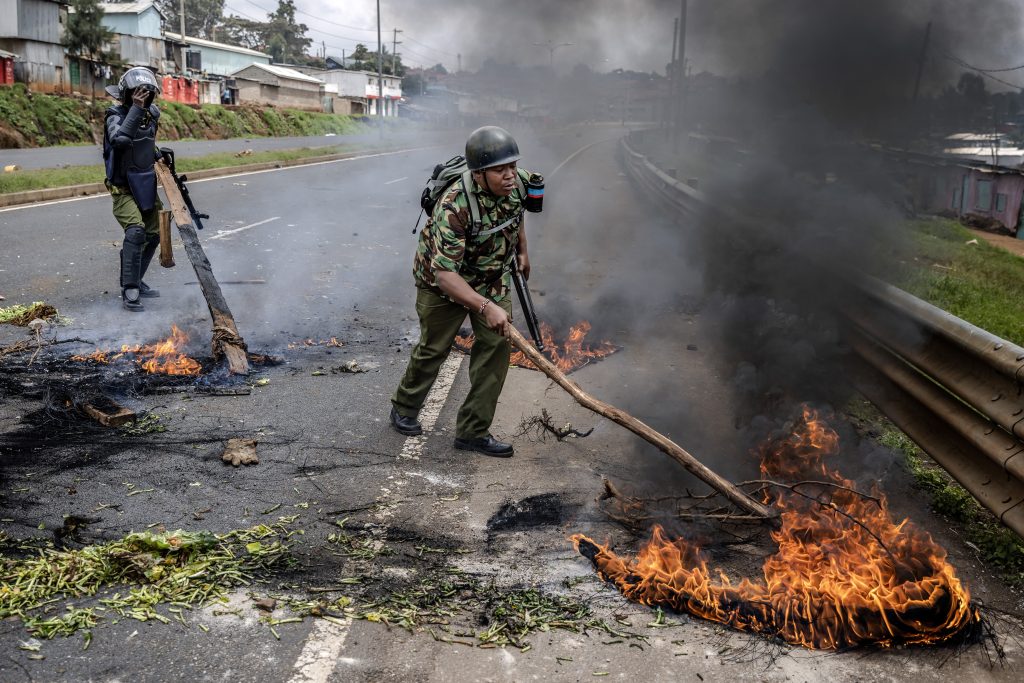
Kenyan riot police fired tear gas on opposition MPs Tuesday and sporadic violence erupted during fresh anti-government demonstrations over a cost-of-living crisis and last year’s disputed election.
Tear gas canisters were launched at members of opposition leader Raila Odinga’s Azimio la Umoja (One Kenya) coalition near President William Ruto’s office in downtown Nairobi, according to footage of the incident.
Kenya’s Interior Minister Kithure Kindiki said there had been several acts of violence, arson and looting in the capital and in western Kenya by “hordes of criminals masquerading as political protesters” and insisted they would not be tolerated.
“To ensure the country does not turn into lawlessness, security agencies are fairly instructed to enforce the law firmly and decisively,” he said in a statement, adding that a total of 46 people had been arrested Tuesday for various criminal acts.
Odinga’s side had last month announced a halt to demonstrations to allow bipartisan talks to try to resolve its dispute with the Ruto government.
But it later said it was resuming protest action as dialogue stalled, with Azimio insisting it should not be a parliamentary process as demanded by Ruto’s side.
Police had announced at the weekend they were banning the new demonstrations after protests in March spiralled into chaos and violence that left three people dead.
Azimio said in a statement that police had been stationed across the capital Tuesday “to prevent us from proceeding with our protests as we had planned” and accused Ruto’s government of sending out hooligans to unleash “mayhem”.
Demonstrations would resume on Thursday, it added.
– ‘Why are they stoning people?’ –
Several vehicles including a public bus and a truck were torched on main thoroughfares in Nairobi, while youths set tyres ablaze and blocked roads in several slums, witnesses said.
“What kind of protests are these now, why are they stoning people? My car has been damaged and I am just doing my own business,” said taxi driver Duncan Mukuche, whose vehicle had come under attack.
Protesters also set fires and used rocks to block roads in and out of Odinga’s lakeside stronghold of Kisumu in western Kenya, they said.
The March unrest had drawn international calls for restraint after police fired tear gas on demonstrators, including Odinga’s motorcade, and gangs went on the rampage, attacking people and property.
The violence had raised fears of a repeat of the 2007/08 post-election ethnic fighting that claimed the lives of more than 1,100 people in Kenya, now considered an anchor of democracy in a turbulent region.
Azimio said its MPs were prevented from delivering a petition to Ruto’s office over what Azimio has described as the “unacceptably high” cost of food, fuel and electricity in Kenya.
They had also tried in vain to submit a petition to the Independent Election and Boundaries Commission showing that the results of the August election were “doctored”.
Odinga narrowly lost to Ruto — his fifth presidential election defeat — and continues to insist that the poll was fraudulent and that victory was “stolen”.
Ruto, who critics say has broken several campaign promises since taking office in September, has branded the opposition action as “nonsense”.
The government has voiced concerns about the impact of the demonstrations on the economy, which is slowly recovering after the Covid-19 pandemic, but is facing high inflation and a huge debt mountain as well as a plunging currency.
str-txw/lcm
© Agence France-Presse





